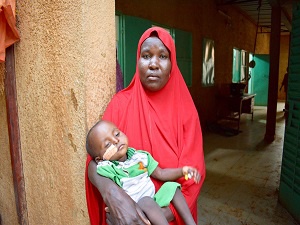
By Simon Hunter
Blue sky and red soil. Bustling capital city and isolated rural villages. Jeeps and donkey-driven carts. Giraffes and camels. Lamb and millet.
Niger is a country of stark contrast, everywhere you turn. However, some things remain consistent right across the land. Poverty. Malnutrition. Disease. Infant death.
Beyond the colour and the noise, you don't have to look far to recognise deep trouble.
A landlocked nation, with an area of nearly 490 thousand square miles, it's the largest state in West Africa, and more than five times the area of the UK. It's home to nearly 23 million people, and the sounds of the bustling streets in its cities give you a sense of just how busy life here can be.
2.3 million need humanitarian assistance this year- the main culprits are food insecurity, malnutrition, epidemics and natural disasters, and they've caused widespread hunger and disease.
Food is scarce in many parts, due to failed harvests through devastating droughts or floods.
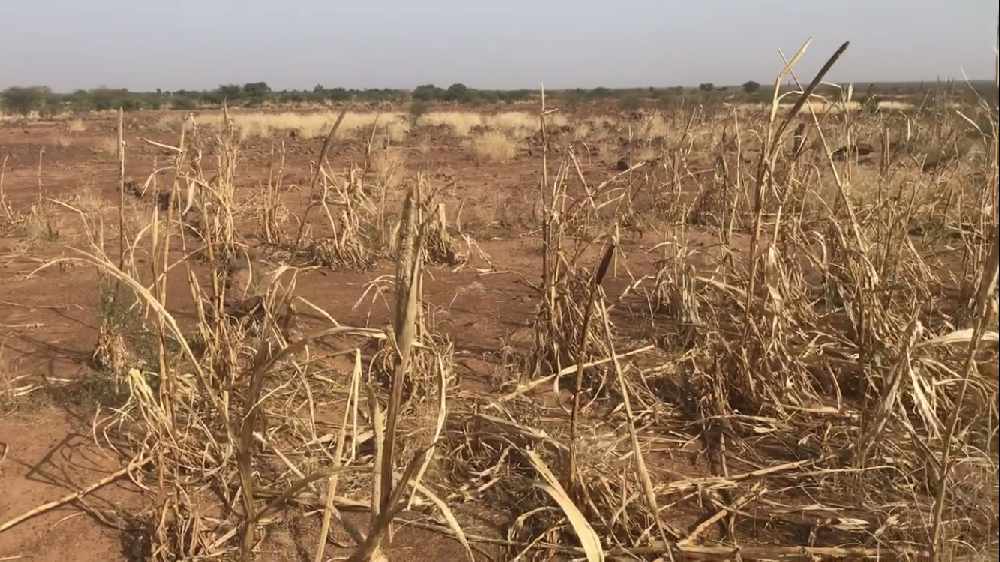
A field of failed millet crop, just outside the city of Tahoua
The threat from terrorist groups such as Boko Haram have led to market closures in places, which also contribute to shortages.
Niger's ranks as 'serious' in the Global Hunger Index, taking into account the likes of infant mortality, and child wasting or undersizing.
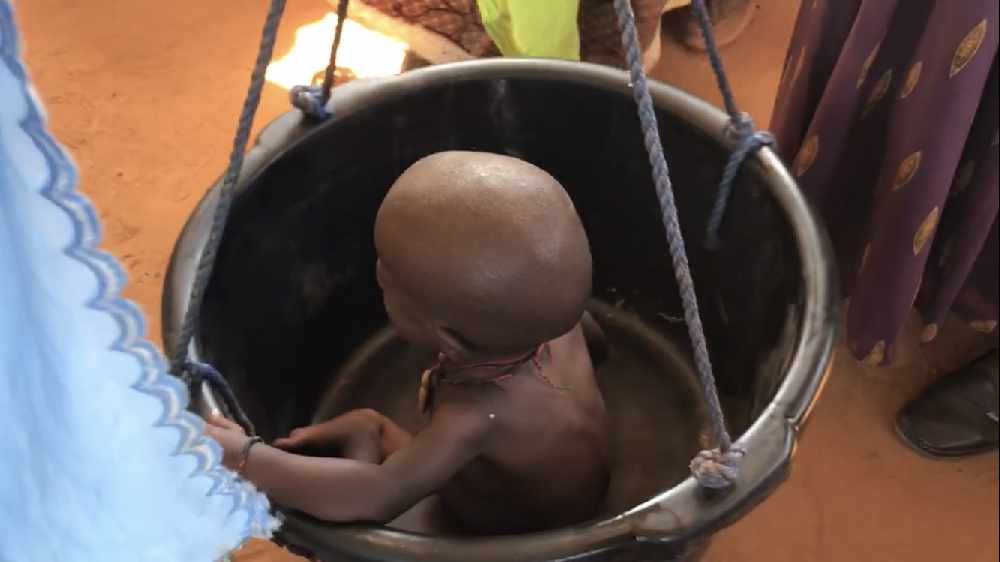
A child is weighed at an emergency healthcare clinic in the village of Afala
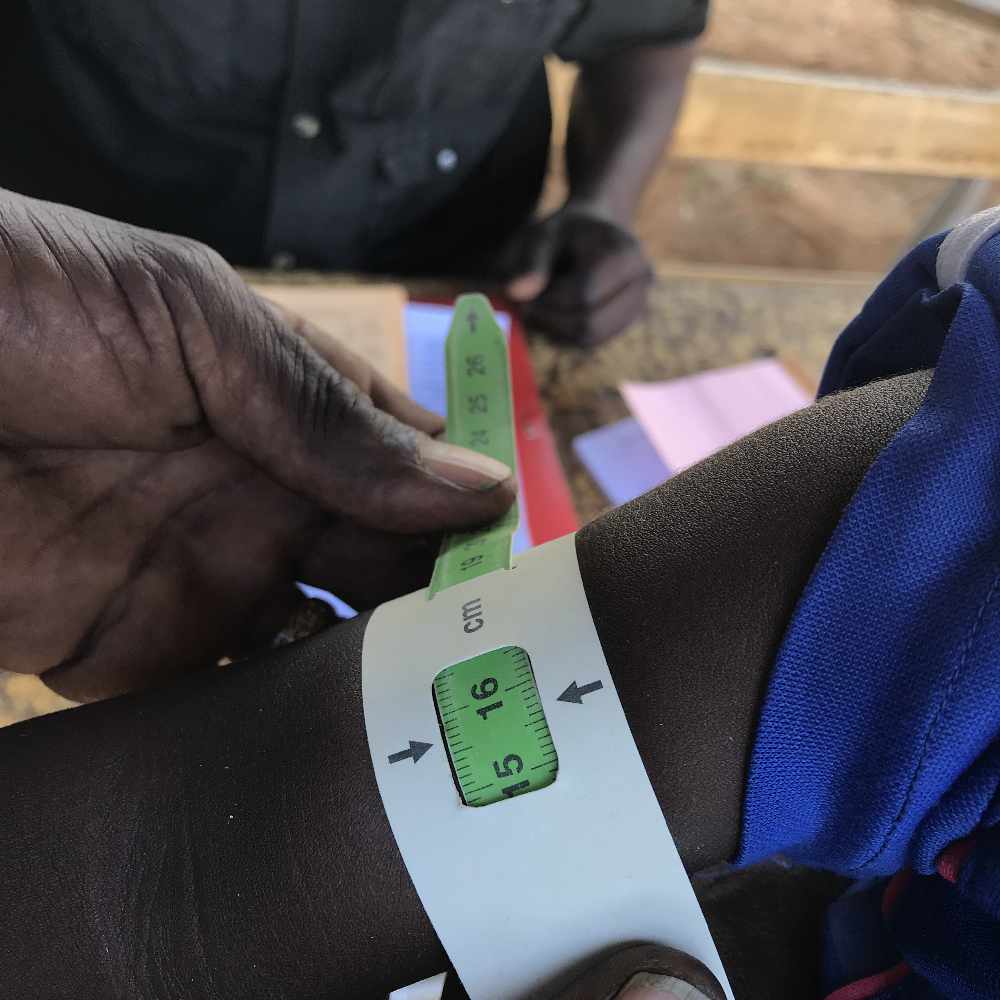 A 'MUAC' band is placed around the arm, measuring the circumference, and determining the severity of malnutrition
A 'MUAC' band is placed around the arm, measuring the circumference, and determining the severity of malnutrition
Concern Worldwide is using crucial aid to not only combat malnutrition, but make sustainable improvements, and I travelled to see its impact.
I spent five days looking at different elements of its work- the dire consequences of infant malnutrition, the impact of peer-to-peer support on improving nutrition standards in the community, the positive change brought about by greater access to healthcare, sustainable agriculture, and the importance of financial assistance in improving livelihoods.
The global charity supports an integrated approach to dealing with childhood malnutrition- children who are ill receive therapeutic ready-to-use food (Plumpy Nut) and medication in hospital or rural clinics.
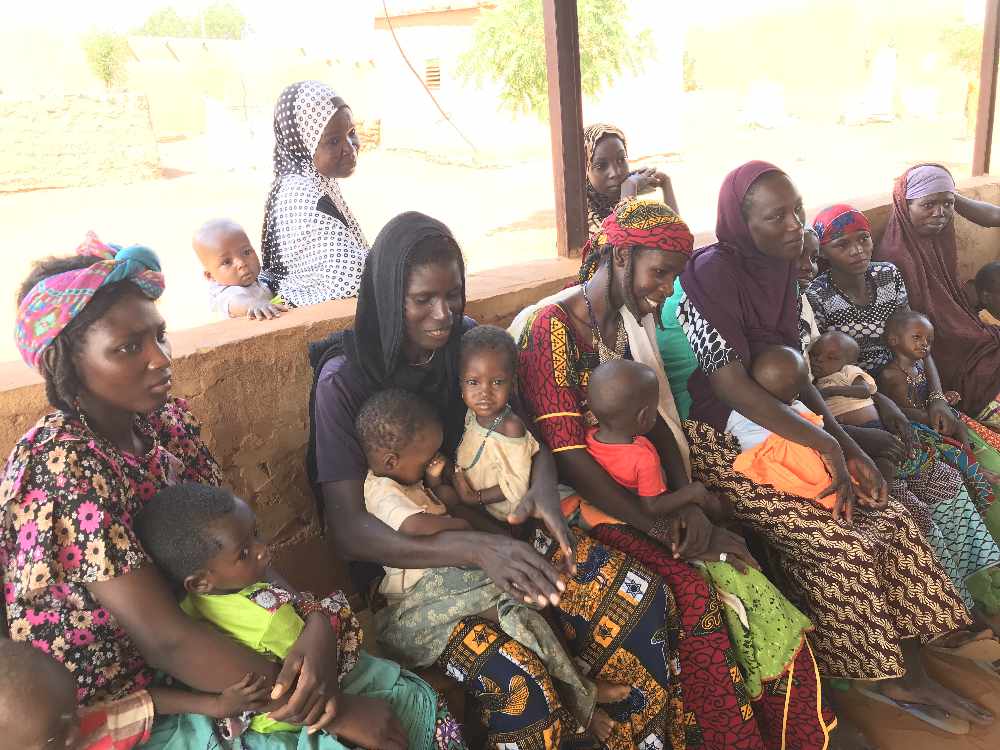
Women wait for their children to be weighed, to determine the extent of their malnutrition
This is of critical importance in pushing back against the serious complications of malnutrition- undersizing, lethargy, and in many cases, viruses, infections and diseases such as pneumonia and HIV.
I witnessed the extensive endeavours of community health workers, in giving people the knowledge and training required to protect themselves in future. This includes advice on the use of mosquito nets, washing hands, infant feeding, and cookery demonstrations encouraging diversity in food.
In terms of construction and production, wells are being fortified with walls and gates to prevent contamination from livestock, while families are being encouraged to set up washing and sanitation points in the home.
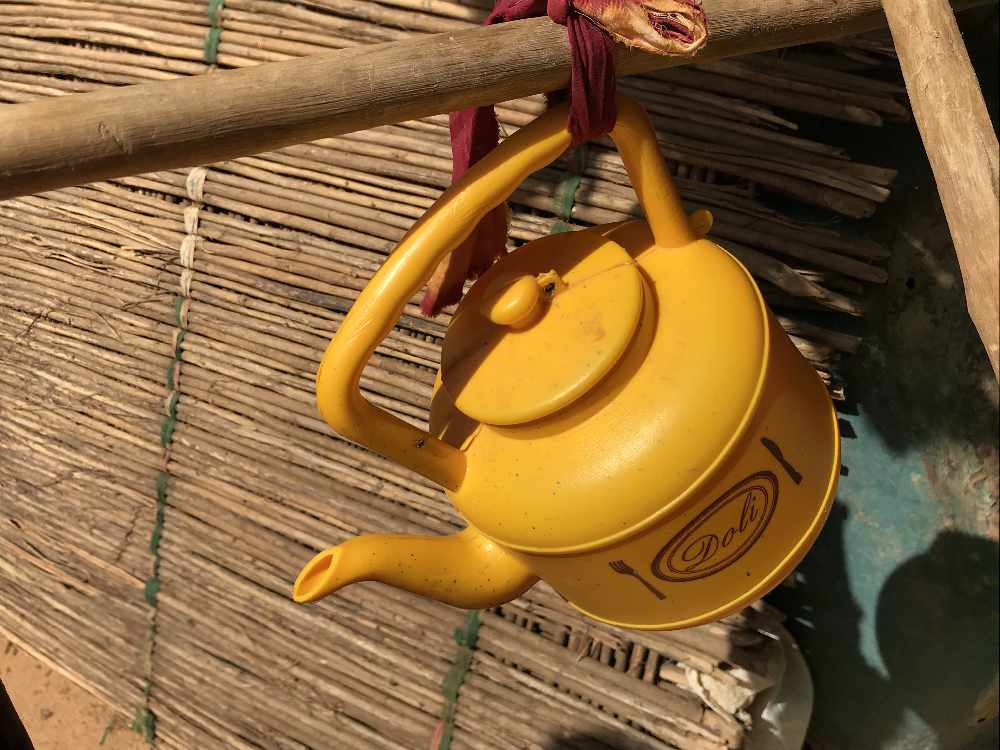
A 'tippy-tap' is used for washing of hands, before and after food, as well as after the use of the toilet
THE CONSEQUENCES OF INFANT MALNUTRITION
CHECK OUT MY ON-AIR RADIO PACKAGE REPORT FROM DAY ONE HERE:
On the first day, I boarded a UN plane to fly to Tahoua, a region in the north of the country. People here have been devastated by failed harvests, leading to widespread hunger.
My journey took me to a couple of crisis centres known as 'CRENI.' They specialise in the stabilisation of children, and deals with referrals of children with severe malnutrition with complications. The complications usually imply viruses, infections or diseases, notably the likes of pneumonia, malaria and HIV.
Most referrals to the centres is between June and October, with the lean season in the fields stretches from March to October. Difficulties in preparation of food, as well as low yields from limited crops are prominent causes for women's journeys here- some travel for up to 4 hours by foot!
Children are usually admitted to CRENI for anything between 3 and 10 days, and the patients receive therapeutic ready-to-use food such as 'Plumpy Nut,' which is a nutritious, milky snack designed to replace lost minerals and sugars. Medication is also accessible here, especially important for the more serious conditions of the kids.
Upon the first visit, diagnoses are made, before a treatment plan is put in place and initiated.
With entry, comes an overwhelming sense of misery. The children are in agony, and their mothers wonder whether they'll still be holding them next week.
Facts and figures reflect the extent of the problem, but the gravity of the situation hit home when I met Fatima Fahamadou, and 16-month-old son Adam. He's still being breastfed, and is half the weight he should be for his age (just 5 kilos).
He was dehydrated after three days of diarrhoea and vomiting, and refused to breastfeed or eat anything, before a trip by car to the clinic.
Fatima told me she's terrified of what might happen to him.
The precious nature of life was made very clear, upon hearing from young mother Chawda Zakariaou. Her 8-month-old girl Ousseina has been there for seven days, and is about to be discharged. She was a twin, but her brother died from problems arising from his severely malnourished state.
Chawda spoke to me about how she feels, with her remaining twin so ill.
It's so tough to see such pain and fear reflected in the eyes of young children, but then I remind myself of the alternative to the emergency care- a much darker picture.
THE IMPACT OF PEER-TO-PEER SUPPORT IN IMPROVING NUTRITION STANDARDS IN THE COMMUNITY
CHECK OUT MY ON-AIR RADIO PACKAGE REPORT FROM DAY TWO HERE:
The next day, it was off to a village called Ezak- certainly rural, and nowhere near what we might refer to as a conventional urban area. The journey there wasn't without incident, however, with two breakdowns to contend with.
The jagged rocks and fine soil on the road there are perhaps fitting, to reflect the harshness and ruthlessness of life in this part of the world.
An overheated engine and flat tyre later, a cookery demonstration awaited under the shade of a leafy Neem tree. Over and above the wonderfully bright reds, greens and purples, and the fragrant spices wafting through the air, there was a specific purpose for the gathering, as part of Concern's efforts to sustain improvements to nutrition standards in communities.
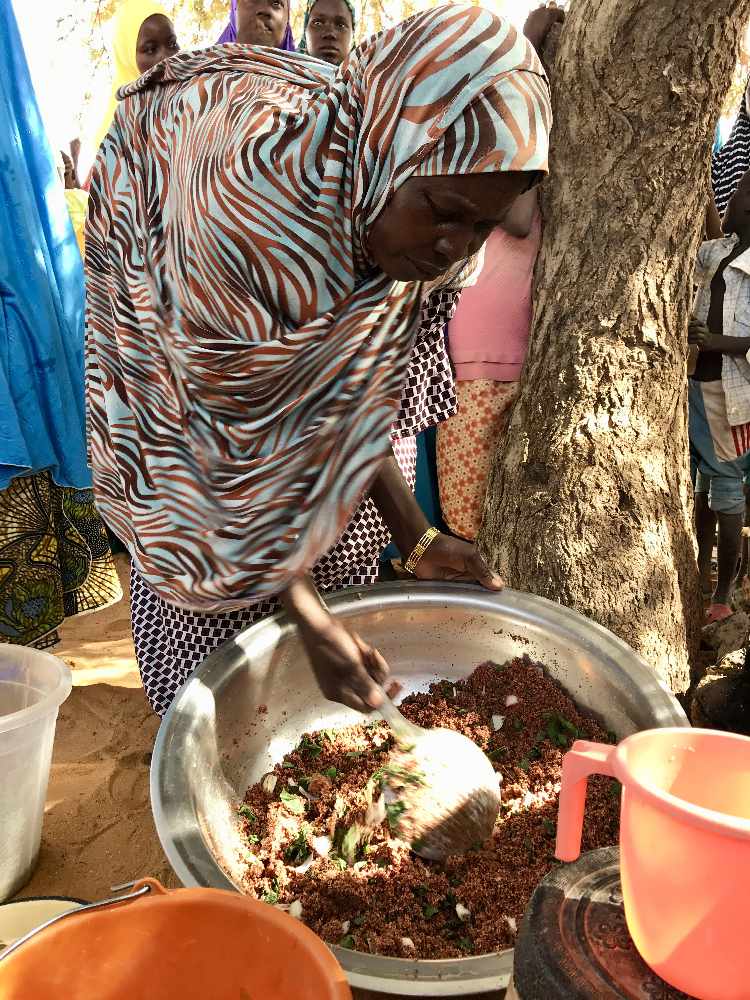
52-year-old grandmother Habsatou Moussa is in charge- she's cooking two types of couscous. One uses local crop millet, while the other is a base of sorghum, and these are mixed with onions, bean leaves, salt and oil.
Habsatou is a "maman lumiere," or "light mother," who passes on her knowledge of clean food preparation, hygiene and sanitation to other mothers in the village, hoping to eventually stamp out the threats of malnutrition and disease for the community.
She explained to me why she feels it's so important.
A celebration at a naming party in Sabon Kalgo
Down the road, in a village called Kossoma, 42-year-old mum Hassana says she's extremely thankful for son Adamou's recovery from malnutrition and malaria over the past year, through treatment. She says it's extremely important to continue following the tips given by community health workers, in ensuring she prepares food in a hygienic way.
What good would the aid be, if it weren't for this sustained approach?
POSITIVE CHANGE BROUGHT BY GREATER ACCESS TO HEALTHCARE
CHECK OUT MY ON-AIR RADIO PACKAGE REPORT FROM DAY THREE HERE:
Agaye is a pretty small place; surrounded by struggling fields, exposed to the searing heat of the sub-Saharan sun. It's as heavily populated by livestock, as it is by people.
It's benefitting from a project called WASH- Water And Sanitation and Hygiene.
The homes are built from mud and stone, in a square shape, and the focal point of the settlement is a newly fortified well.
With all of the cows and goats which roam freely between the homes, there's a very real possibility one or two could fall in and contaminate the water source. Indeed, that's been a problem in surrounding areas.
The work being done by Concern here, however, has allowed for the building of a wall and gate to ensure this doesn't happen. Furthermore, it's carefully managed by grandmother Diaba Idrissa.
She told me there's a fine involved for anyone who doesn't pay respect to the rules!
A man gathers his water from the fortified well in Agaye
Soaps and clean running water are things I certainly take for granted, so it's incredible to see how much of a change has been made by their introduction to Agaye.
A 'tippy tap' is a bit like a watering can- providing free flowing water for washing hands and preventing contamination of food.
52-year-old grandfather Zakary Yaou is head of the Water Management Committee in Agaye village. He's using a tippy-tap
Bars of soap are not only distributed through the community, but also made by the locals, which is made possible through aid and the passing on of production skills.
I jumped back in the jeep to head down the road to Afala. A remote clinic is being supported by Concern, providing not only emergency medicine, but tutorials for women to understand how best to look after the health of their vulnerable children.
It's especially important when there isn't always a wide range of food types available, and diets are limited.
It took an hour to reach it, for a 35 kilometre trip, owing to the dusty and rocky nature of the road, and the the palpable desperation of young mothers hits you as soon as you reach the clinic.
Ghaichatou Salah was there with her twin two-year-olds, Hassan and Hassana. Both are severely malnourished and have malaria, and had arrived for their third visit. They receive peanut paste food, soap and medicine for treating their condition.
Their mother told me she's frightened.
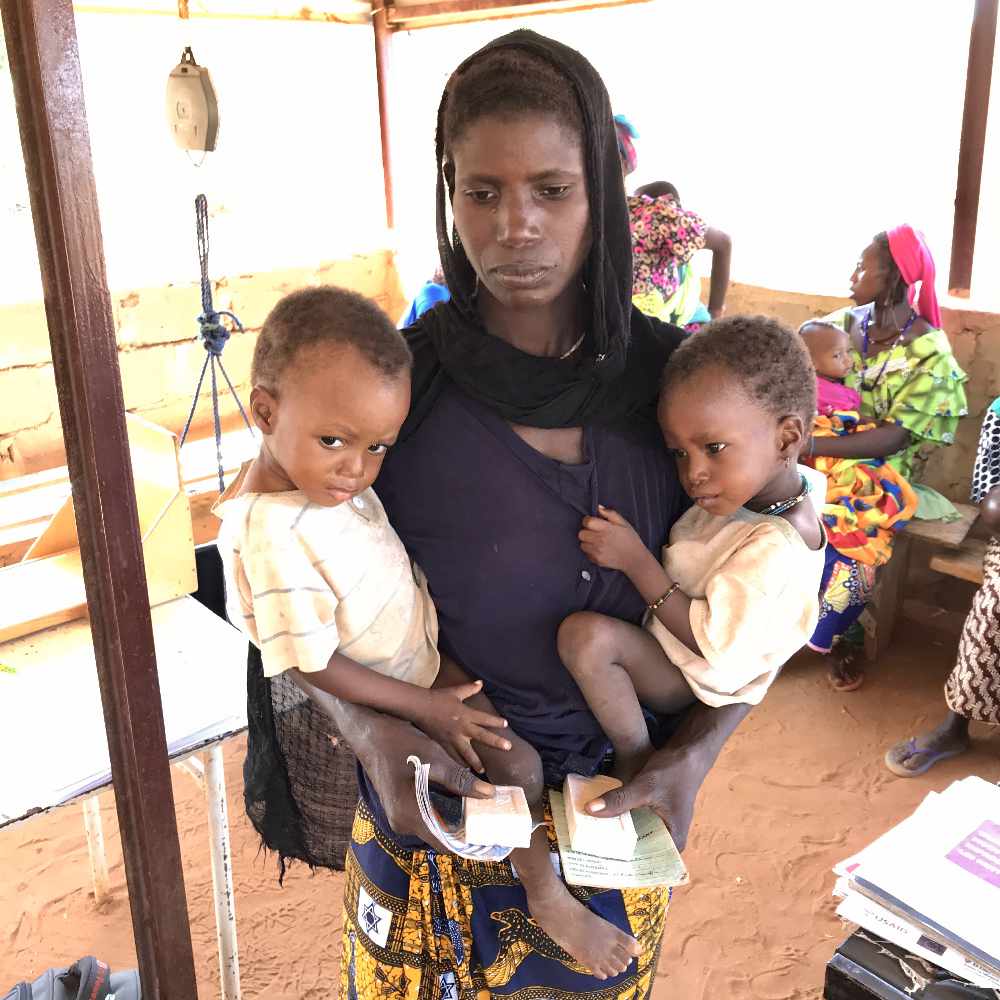 Ghaichatou's 2-year-old twins Hassan and Hassana are being treated for malaria
Ghaichatou's 2-year-old twins Hassan and Hassana are being treated for malaria
The medicine and advice on improving healthcare is a lifeline. That lifeline is only available because of the aid work here.
Without it, you just dread to think what the next days, weeks or months would look like for people here.
SUSTAINABLE AGRICULTURE
CHECK OUT MY ON-AIR RADIO PACKAGE REPORT FROM DAY FOUR HERE:
Another major area of work being done is providing people with hardy crops, which can survive the arid climate, and the skills needed to cultivate them.
Sabon Kalgo is a beneficiary of a programme known as RAIN- Realigning Agriculture to Improve Nutrition.
It's difficult to exaggerate just how hostile the soil is here. In Northern Ireland, you'd rarely venture into a field without wellies or suitable footwear for the damp, muddy terrain. There, it's more a case of putting your foot down, and getting a sharp jolt through the knee.
What strikes me is the stark contrast of what you see up above and down below.
The rich green of the neem trees, with the needle leaves spindling in the wind, is set against a vibrant blue of the cloudless sky.
Take your eyes down a level, and you’re reminded of the hardship of life here.
Only Grey weeds dot the brown sand, with animal droppings from chickens, goats and cows forming a dirty trail on the ground below. Our usual thoughts when we hear the word 'lake,' don’t tend to imply a lifeless, sewage-coloured body of water, sitting stagnant in between the dome shaped homes.
But the attitudes of people here are positive, happy they are already growing their own crops, and feeding their families.
Just under half the village is benefitting from the programme (population of 2,240 people; 1,260 beneficiaries). It is one of 32 villages in two districts - Bambeye and Tebaram - to be part of the programme.
Father of three Mika Abdu told me he's delighted his family is much healthier, thanks to a diversified diet. He's already harvested his crop of bio-fortified millet (only requires 65 days of growth compared to the 110 needed for local millet).
Mika waters his new plants, growing in 'sacs potagees'
EFFECT OF FINANCIAL SUPPORT ON LIVELIHOODS
CHECK OUT MY ON-AIR RADIO PACKAGE REPORT FROM DAY FIVE HERE:
The final day involved a trip to Sarkake, a village benefitting from emergency cash transfers, helping people who have lost all hope of food through a failed harvest last year.
A line of women queued under the shade of a tree, waiting to step forward and receive their money. Each family, with an average of 7 in each household, receives about 32,000 francs per month, which equates to about £50.
80-90% of that on average is spent on food at local markets.
Tsahara Maidagi is a mother-of-four. After the crops failed, and before the emergency money arrived, she told me she couldn't sleep at night, not wanting to wake up the next morning. She didn't know where she could find the food for her little ones.
Tsahara arrives for her emergency cash transfer
Tsahara's story gives an indication of just how precarious life is for many people in Niger.
In the course of a week there, I saw how failed crops, limited diet, financial poverty, and security concerns are to blame for malnutrition and disease.
And not just in one-off case, but widespread. Its impact is hardest on very young children, who have little or no idea about the trouble they face.
But they have hope- that hope is in the form of the work being done by Concern, to introduce and sustain improvements in nutrition, healthcare and agricultural standards.
However, it's only made possible through aid.
Here's the information you need if you wish to know more about how you can support the work of Concern Worldwide:
To support Concern’s work tackling hunger in Niger, sign up to the Concern 24-hour fast on 22 November: http://www.concern.org.uk or http://www.concern.net/fast
Email: getinvolved@concern.net
Phone: 0800 032 4001
Web page: http://www.concern.org.uk/get-involved


 Teenage girl killed in road crash named as Kamile Vaicikonyte
Teenage girl killed in road crash named as Kamile Vaicikonyte
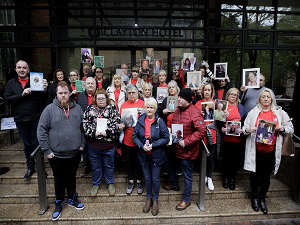 Covid-19 inquiry ‘an opportunity for candour’ from Stormont leaders
Covid-19 inquiry ‘an opportunity for candour’ from Stormont leaders
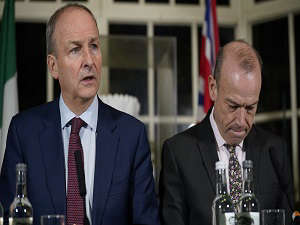 UK and Irish ministers to meet amid row over migration
UK and Irish ministers to meet amid row over migration
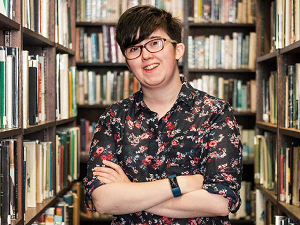 Three men set to go on trial for murder of journalist Lyra McKee
Three men set to go on trial for murder of journalist Lyra McKee
 Swann refuses to rule out resigning if budget is not changed
Swann refuses to rule out resigning if budget is not changed